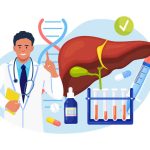Hope for Liver Cancer Patients
For good historical reason, liver cancer is a feared consequence of liver disease. Learn more about the array of inventive options modern technology provides and the encouraging reasons why hope may replace the fear that previously gripped liver disease patients.
The information contained in this article is not intended as medical advice, nor to replace the expertise and judgment of a physician or cancer care team. It is intended to help individuals and families make informed decisions, together with their doctor.
A diagnosis of liver cancer can evoke fear in any individual. As is the case with any health concern, the more information learned about the condition, the more that fear is quelled. Recent research and development into liver cancer has broadened an affected person’s options by unveiling portions of its pathology, increasing treatment specificity and instilling hope where there previously was little.
Treatment Basics
The goal of treatment will vary depending on the characteristics of each person’s cancer. If the cancer can’t be cured, the goal may be to remove or destroy as much as possible to prevent or prolong its growth, spread or return. Other approaches to incurable cancers are treatment strategies aimed solely at easing symptoms.
Choosing the best way to treat or manage cancer can seem like a crash course in oncology. While it may feel like a quick decision needs to be made, sufficient time to absorb all of the possible options and communicating with all of those involved in your care are important components to making the choice that best suits you.
When making a decision regarding liver cancer treatment, include seeking a second opinion from a physician experienced in your specific diagnosis. A second opinion will provide you with more information and help you feel more confident about the treatment plan being considered. Some insurance companies even require a second opinion before they agreeing to pay for certain treatments, and most will pay for that second opinion.
The lack of consensus regarding the best treatment of liver cancer has contributed to the pessimistic attitude that many have regarding its treatment. Aggressive treatment strategies can cure or significantly prolong the life of many people with liver cancer.
Many types of treatment for liver cancer now exist, including surgery, radiation therapy, ablation therapy, gene therapy and chemotherapy. An integrated approach using a combination of two or more of these methods often provides optimal results.
A thorough evaluation with the appropriate specialist will determine a person’s suitability for the recommended therapy.
Treatment Specifics
Surgery – Even after 80% of the liver is surgically removed, this resilient organ can regenerate, growing back to its original size in about three weeks. Although surgery is currently the only way to potentially cure liver cancer, newer techniques are being developed to make both partial removal of the liver (resection) and liver transplantation, safer and more effective. Some advances in surgery for liver cancer include:
· Laparoscopic surgery – small incisions are made in the abdomen through which specially designed instruments are inserted to view and cut out the diseased portion of the liver.
· Pre-operative portal vein embolization – this technique stimulates liver regeneration prior to surgery. By shifting the hepatic blood supply to a healthy portion of the liver prior to the resection, the healthy part of the liver grows larger. Recovery from a liver resection is more successful when performed with a sufficiently sized portion of healthy liver tissue.
· Liver transplant – this option is reserved for those with several small tumors but whose cancer cannot be removed entirely. Patients must typically wait a long time before a suitable liver can be found.
Doctors are studying ways to make more liver cancers operable by trying to shrink them prior to surgery. Studies are now looking at different types of neoadjuvant therapies (therapies given prior to surgery), including chemotherapy, immunotherapy, embolization, and radiation therapy. For those who are not surgical candidates, other options are becoming increasingly available.
Radiation Therapy – Radiation therapy uses high-energy rays (such as x-rays) to kill or shrink cancer cells. Radiation therapy’s primary drawback is that it also damages healthy liver tissue. Researchers are working on new methods of specificity in order to deliver radiation therapy only to the cancer, sparing the normal tissue.
Three of the newer approaches to radiation therapy include:
· Radiosensitizers – injecting drugs into the hepatic artery that make cancers more vulnerable to radiation.
· Radioembolization – involves infusing radioactive substances directly into the hepatic artery to affect liver tumors more precisely.
· Computer mapping – uses computers to map the exact location of a tumor. This lowers the damage to normal tissue and allows higher doses to be used.
Ablative Therapies – Ablation uses a chemical agent or electrical current to destroy a tumor. Ablative procedures include:
· Cryosurgery – freezes and kills tumor cells.
· Radiofrequency (RF) ablation – radio waves heat the tumor to high temperatures to destroy cancerous cells.
· Alcohol ablation – administers toxins directly to a tumor.
· Embolization – blocks the blood supply to a tumor.
Ablation therapies can be very effective, but are typically intended to control cancer rather than cure it. They can be used alone or in combination with surgical removal of a tumor. For example, a patient with HCC who is not a candidate for surgery may first be treated with embolization to shrink the tumor so that it is small enough to make another form of ablative therapy or surgery possible.
Controlling and minimizing cancer growth is the premier objective at many top cancer treatment centers. At Memorial Sloan Kettering Cancer Center in New York City, physicians are currently investigating the use of the Asian herbal formula, Sho-saiko-to, on patients who have undergone hepatic artery embolization.
Gene Therapy – In hope of developing gene therapies for defective DNA replacement, scientists are learning more about many of the genes damaged when normal liver cells convert to HCC. The p53 gene is a tumor suppressor gene that is often altered in liver cancers. In normal liver cells, p53 prevents excessive growth, helps cells repair DNA damage and promotes the death of cells with DNA damage beyond repair. Clinical trials are in progress to determine if restoring normal p53 DNA to liver cancer cells might suppress tumor growth and cause cancer cells to die.
Chemotherapy – Primarily intended to slow cancer growth, chemotherapy is the intravenous administration of potent drugs. Much research is underway to discover effective and well-tolerated chemotherapeutic drugs against primary liver cancer. Two areas of interest include:
· Hepatic artery chemoinfusion – researchers are attempting to improve chemotherapy effectiveness by administering medication directly into the hepatic artery. This way, the liver’s healthy portion has a greater chance of removing the unused drug before it can reach other parts of the body.
· Monoclonal antibodies – these substances belong to a new class of anti-cancer drugs showing great promise against liver cancer. Monoclonal antibodies work against the sprouting of new blood vessels that nourish tumors, inhibiting cancer growth without damaging healthy tissue. These powerful antibodies bolster the effect of chemotherapy regimens.
Never Give up Hope
Liver cancer research is reaching levels never before seen. Scientists are searching for the causes of liver cancer, ways to prevent it and new treatments to improve its outcome.
The increased specificity and specialized knowledge surfacing in liver care is resulting in an increasing number of hepatologists functioning within highly skilled oncology teams. Patients benefit immensely from these team members’ increased understanding of liver function and pathology, as well as their intense focus on liver disease.
Complementing this expertise is the surge of inventive, extremely useful, high-tech surgical devices, advanced radiology equipment and ultra-modern chemotherapy. All of this progress has greatly facilitated safer performance of increasingly aggressive liver treatments and made it possible to offer therapy to even more liver cancer patients.
Participating in the decision-making process translates to taking an active role in your own care. Find out how the new aggressive treatment strategies may benefit you. Educate yourself on all of your options, seek a second opinion, find practitioners whom you can communicate with and trust and most importantly, be inspired by medicine’s progress by not giving up hope.
www.cancer.org, What Is Liver Cancer?, American Cancer Society, Inc., 2006.
www.emaxhealth.com, Liver Cancer Linked to Cellular Repair Pathway, DukeMed News, 3/29/06.
www.livercancer.com, What’s New in Liver Cancer Research and Treatment?, West Penn Allegheny Health System, 2002.
www.liverfoundation.org, Exciting Treatments Offer Hope to Patients with Liver Cancer, David J. Reich, MD, FACS, 1/31/06.
www.mamashealth.com, Liver Cancer, mamashealth.com.
www.mskcc.org, Primary Liver Cancer, Memorial Sloan-Kettering Cancer Center, 2006.
www.nih.gov, New Compound May Protect Against Liver Cancer, The National Institutes of Health, 2/15/06.











